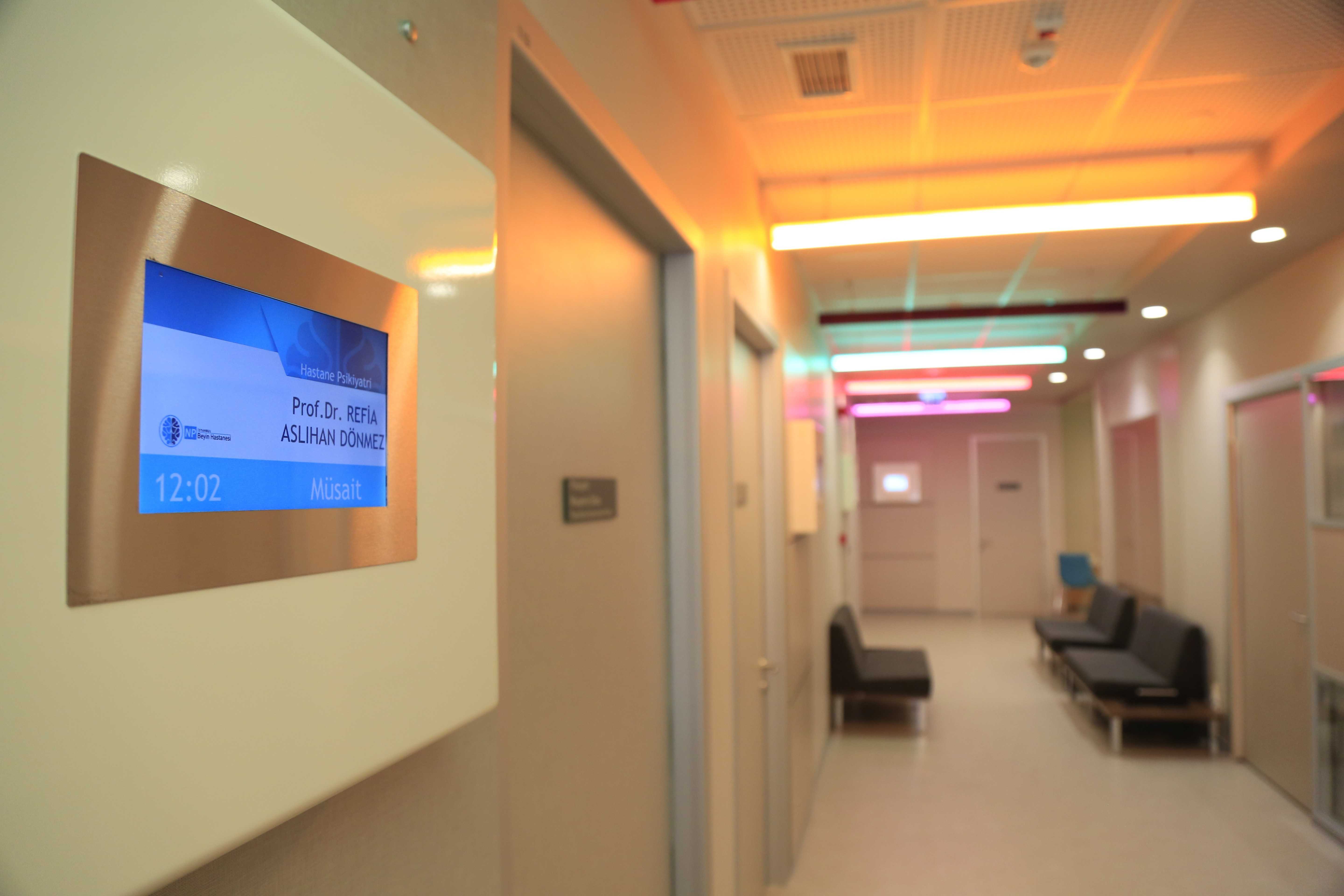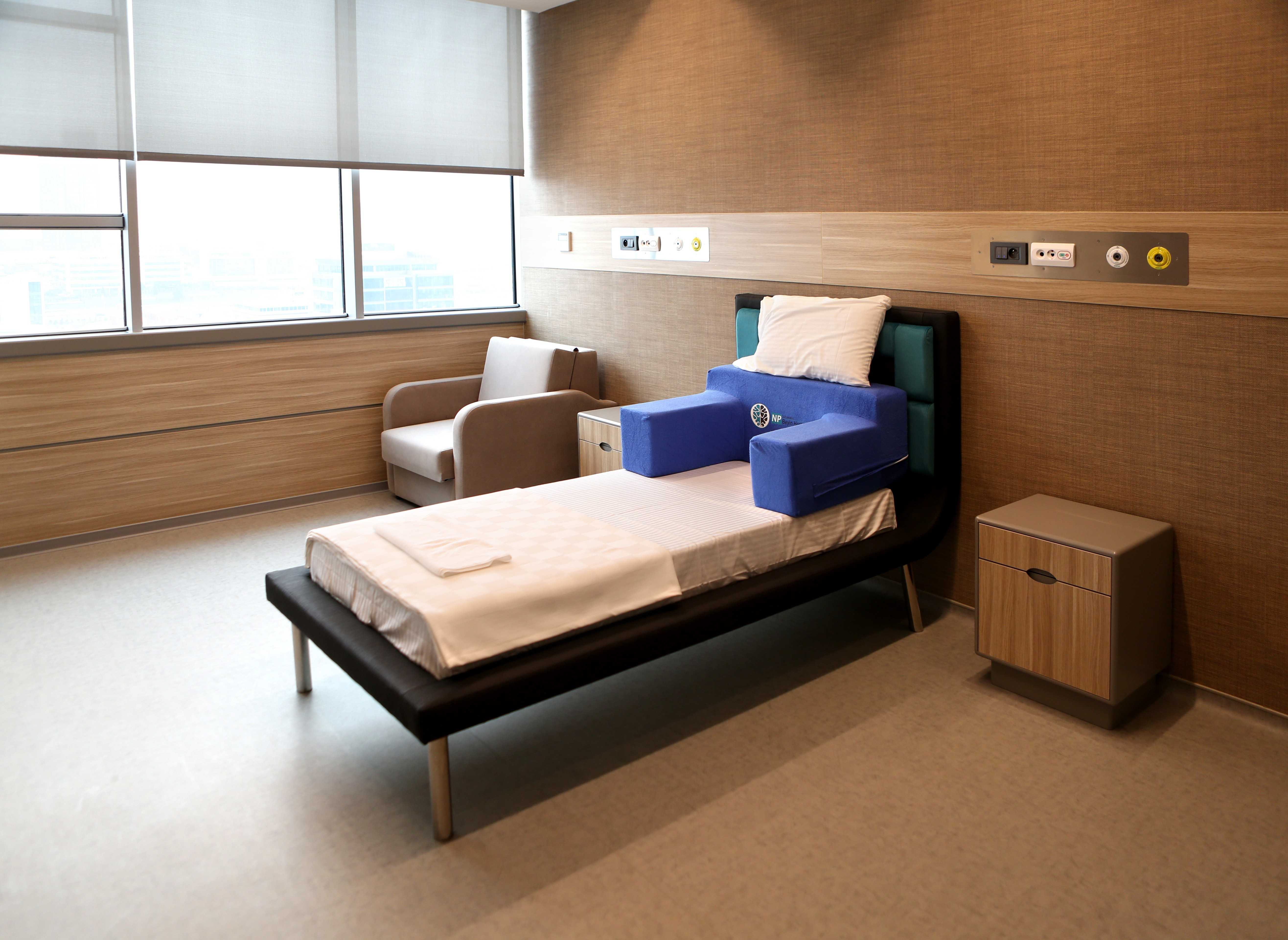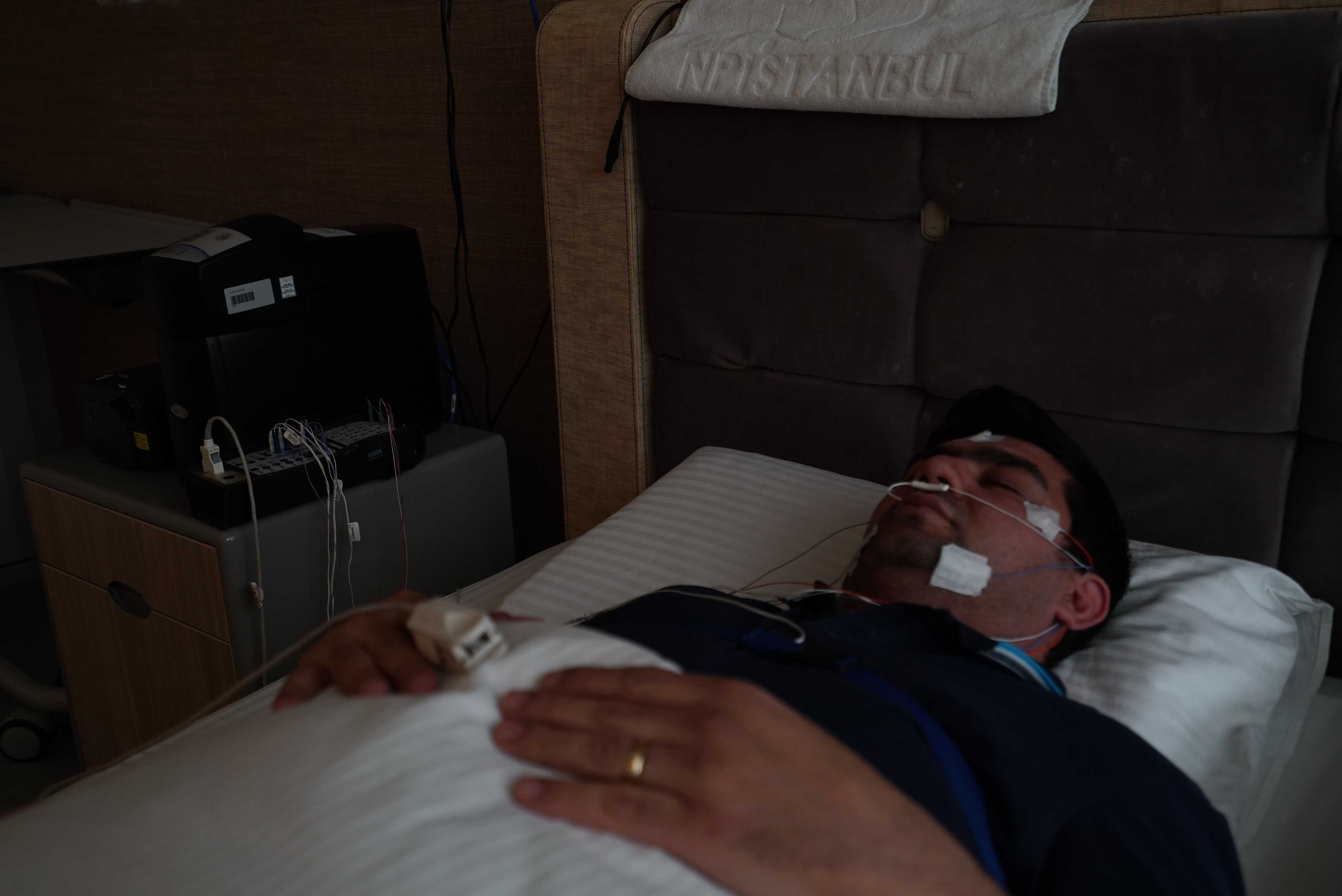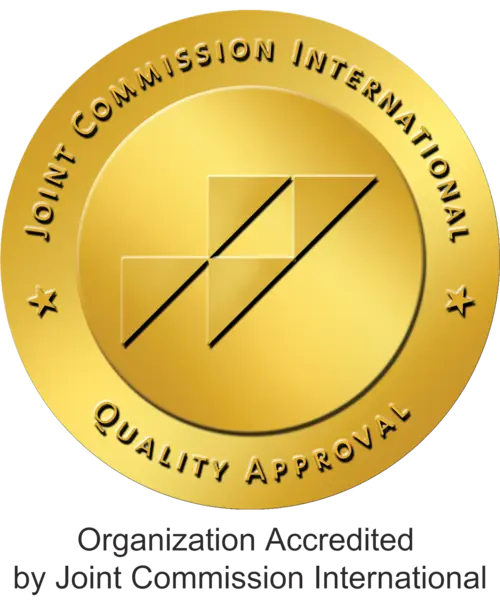Polyclinic of Adult Psychiatry
Our patients in the Adult Psychiatric Service are in inpatient treatment. Each service in our hospital was created within the framework of certain rules according to the patients' privacy and the risks of the patient receiving inpatient treatment.
At the NPİSTANBUL Brain Hospital where the comfort of the patient and his / her relatives is kept on the front burner, there are two types of room options designed according to different needs. Standard and A type suites are available. Type A suite rooms and corner suite rooms are aimed at high comfort without sacrificing from security.
To ensure the comfort and safety of our clients in every room, all furniture has been selected and designed specifically for this purpose.
In all our rooms, the comfort of patients and their relatives receive VIP services according to their needs such as televisions with domestic and foreign channels, safe box, resting chair seat to newspaper service.
In our hospital, interview rooms aiming to protect the confidentiality of the patients and their relatives with physicians, waiting areas in each clinic and daytime halls as well as winter gardens designed to make the patients feel comfortable and at home.

SECURITY OF INFORMATION
NPISTANBUL Brain Hospital keeps patient privacy and confidentiality in the foreground. This policy applies to all health services offered in the NPGROUP. NPİSTANBUL Brain Hospital diagnosis and treatment services are responsive to the fulfillment of the legislative requirements in life, in response to patient’s needs and expectations in service provision.
PHYSICAL SECURITY
The physical and mechanical measures that are structured in accordance with the defined psychiatric risks of the patients as the rooms of our services have house-like and the corridors have a street-like vie
DEPRESSION
Depression, like other diseases, is a medical condition, such as heart or stomach ulcer. Clinical depression, like other diseases, consists of a group of signs and symptoms that are usually similar but vary in person. Such as constantly feeling sad and “empty”. Feelings of despair, helplessness, guilt or worthlessness. Substance abuse. Relentlessness in daily work or decreased sexual desire for daily work. Appetite and deterioration in sleep patterns. Irritability, easy crying, anxiety and fear. Decrease in concentration, forgetfulness and difficulty in making decisions. Suicidal thoughts, suicide plan or initiative. Long-term, physical complaints that do not respond to treatment become painful.

“Adjustment Disorder” may develop in response to stressful events in some people. Although this disease is seen in people from every group, it is mostly observed in teenagers. When a person is faced with a new situation or stress factor (eg physical illness, loss of work, divorce, living in poverty) work and family life, school life is affected negatively.
STRESS
The extreme tension can affect the whole life. Research shows that stress is the cause and the source of many illnesses. It affects human health in a wide range of conditions, from internal stress, to deterioration of the body's immune system. Stress depolarizes the balance of the person. Through using own strength, the person can relieve tension and cope with stress by learning about body and mind relaxation exercises.
EARTHQUAKE AND TRAUMA
Some people who are exposed to an earthquake disaster may experience emotional problems, even if there is no physical injury. Feelings such as fear, anxiety, guilt, regret, anger, pessimism, panic, helplessness and embarrassment are deep and intense. These feelings may change frequently. The person feels more nervous than before. In some senses there are sudden ups and downs. Anxious, angry or pessimistic.
MANIC DEPRESSIVE DISORDER
“Manic Depressive Disorder” depression is a mental illness that has the phases of (grief, reluctance, anxiety, anxiety, fear, pessimism, unhappiness) and mania (excessive joy, excessive courage).
SCHIZOPHREMIA
Psychological experience is the deterioration of the ability to test the resultant facts of division, separation and fragmentation. There are four types of it. The treatment varies according to the subgroups. Recent research has strengthened the view that schizophrenia is a brain disease. Therapies and appropriate drugs to prevent the generation of faulty genes in the brain are being addressed.
SOCIAL PHOBIA
It is a disease seen in the same ratio in men and women and it starts in young age. They show personality traits known as shyness. Fear, excitement, sweating, hand flicker, facial flush, nausea, vomiting, feeling of going to bed, excitement is seen when in community. They tend to lack eye contact and self-esteem as well as insufficient self-confidence. They have the fear of making mistakes as they live in fear of embarrassment
PARANOIA
There are various types of illness, also known as “Psychotic Disorder”. It is consisted of skepticism, grandness, erotic, delirium, jealousy, such as thought disorder. Untrue thoughts influence the life of the person, causing friends and enemies to mix up. The social role is distorted and incompatible. The chemical balance of the areas responsible for skepticism, jealousy, and rage in these brains is also deteriorating.
ADDICTION
Psychological and physical addictions such as alcohol, cigarettes or other substances are increasing in society. Especially the delirious substance abuse affecting young people and the inability to do without it require special diagnostic and treatment methods. If these individuals are thought to be damaged in their brains, then treatment should be approached with biological, psychological and social approaches. If the excitement is the sole purpose and expectation of the person's life, treatment becomes urgent. If physical injury has occurred, then dangerous use of the drugs becomes a concern. Psychologists and psychiatrists in the addiction unit need to conduct appropriate treatment with cooperation.
PANIC DISORDER
If a person starts to suddenly feel very intense palpitations, chills, shortness of breath, dizziness, dying or fear of losing control, these signs indicate a “Panic Disorder”. People are often referred to emergency services for fear of losing their mind, suffering from a heart attack or brain hemorrhage, paralysis, and they are examined. Avoiding driving alone, crowded places, being alone because of fear, can ruin someone's quality of life even further.
MASKED DEPRESSION
It is also called atypical or hidden depression. The depressed mood of the person is not in the forefront. Physical symptoms, pain, asthma attack, gastrointestinal, heart problems, dizziness, imbalance, nausea, vomiting, numbness, weakness, fears, obsessions, forgetfulness, drinking and smoking, hotheadedness. Masked Depression is more common in children, teenagers, and elderly people. Stress effect is especially important.
MARRIAGE PROBLEMS
A stressful marriage has negative effects on both parties. It causes problems such as pain, numbness, anxiety, high tension and depression. If it continues, it affects physical health negatively. When the conflicts are big, the influence to the family is also strong. Children growing up in intense conflict marriages have more problems than other children. If no preventions are made, it may bring marriage to the end. If couples cannot figure it out, a professional help and marriage therapy is needed.
OCD (OBSESSIVE COMPULSIVE BEHAVIOUR) EATING DISORDER
It is a disease that is linked to unwanted thoughts, desires and movements are a disease. The person knows that these are meaningless and absurd acts, but cannot control and manage. Constantly fights with harmful ideas. Always worried and annoyed. There is suspicion, disease, counting, cleaning, metaphysical obsessions and behavioral disorders. Life becomes unbearable in the anticipation of a feeling of uncertainty and expecting to experience something horrible. This condition, which is beyond person’s power, should be healed with a specific treatment that will lead to good results.

PERSONALITY DISORDERS
Paranoid Personality Disorder, Schizoid Personality Disorder, Schizotypal Personality Disorder, Antisocial Personality Disorder, Borderline Personality Disorder, Histrionic Personality Disorder, Passive-Aggressive Personality Disorder, Sadomasochistic Personality Disorder are all personality disorders. Personality disorders are observed during adolescence or earlier. Personality disorders lead to significant deterioration in the person's companionship. When a person is faced with a new situation or stress factor (eg physical illness, loss of work, divorce, living in poverty) work and family life, school life is affected negatively.
SLEEP DISORDERS
There are many varieties such as insomnia, snoring, sleep apnea are major sleep disorders, including sleep disturbances in the legs, restless legs syndrome, narcolepsy, cataplexy, sleeping terror, tooth creaking, bed-wetting. Sleep disorders include insomnia, snoring, sleep apnea as they are the most common sleep disorders and there are many types of neurological disorders. Eating disorders include two clinical manifestations. Anorexia Nervosa and Bulimia Nervosa. Anorexia Nervosa is an impairment of the individual's perception of his/her own body and ultimately is perceived as overweight, refusing to be fed, and thus suffering from excessive weight loss. It is one of the rare disorders that can result in death in mental disorders. Bulimia Nervosa is an eating disorder in which excessive eating and diet periods are intertwined. Bulimia Nervosa begins in adolescence and early adulthood. 90% of Bulimia patients are women. Due to the problems that Bulimia patients experience during impulse control, many problems are brought to the clinic together. Substance abuse, emotional imbalance and suicide attempts are also frequently encountered in the stories of these patients.
SEXUAL IDENTITY DISORDERS
According to psychiatric classification system DSM IV, Pedophilia, Exhibitionism, Fetishism, Sexual Masochism, Sexual Sadism, Transvestite Fetishism, Voyeurism, Transsexuality or homosexuality in the old term are classified under the title Paraphilia (Sexual Deviations). Under the title of sexual dysfunction according to DSM IV, “Individuals who do not prefer their sexual identity, role and orientation” are implied. Those who have had gay experiences without being disturbed by their own sexual identity are not included in this classification.
SEXUAL DYSFUNCTIONS
Sexual life disorders such as excessive masturbation, decrease in sexual desire, decrease in sexual stimulation, lack of orgasm, premature ejaculation, unpleasant emotions, painful sexuality.
GENERALIZED ANXIETY DISORDER
The symptoms are restless, uncomfortable, distressed, disturbed, irritable, angry, impatient, ineffective, tense and loud speaking. Sensitive to loud noises. Always on the lookout for something bad. Physical symptoms; Nausea, vomiting, frequent urination, dizziness, numbness, tingling, tingling, aching, palpitations, deep breathing, air hunger, chills, redness, chest pain, loss of appetite, insomnia, fatigue.








